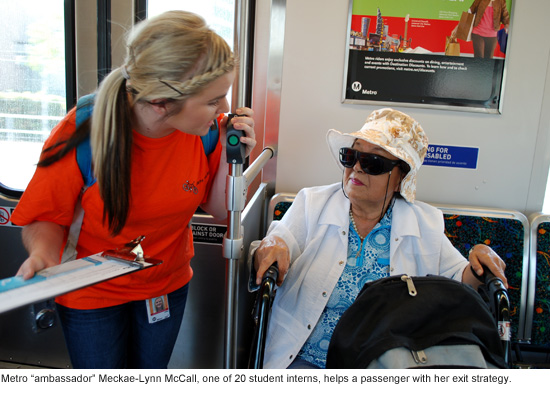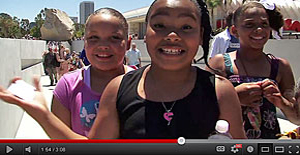Metro’s orange brigade hits the rails
July 13, 2011
 Meet Meckae-Lynn McCall, train ambassador.
Meet Meckae-Lynn McCall, train ambassador.
Although she’s just 20, and her ambassadorial appointment only lasts as long as her summer internship, she’s already got some diplomatic moves down.
There she was on an eastbound Gold Line train Thursday morning, brightly smiling as she complimented a bicyclist for stashing her ride in the correct area, and gently counseling an elderly traveler about where to exit (“The next station you’re going to want to get off…You’re very welcome, ma’am.”)
McCall is part of a new Metro summer program in which teams of student interns are jumping aboard trains and approaching customers at stations to spread the word that bikes—as well as wheelchairs, suitcases and other large items—now have a designated place on Metro trains.
Enforcers they’re not. Rather, the train ambassadors’ role is to “catch people being good,” said Alice Tolar, a Metro transportation planning manager who is overseeing the program.
“If I see you standing with your bike in the appropriate area, I’m going to thank you for that…We’re also letting non-cyclists hear what’s going on,” she said.
In addition to reinforcing good behavior, the interns will be handing out brochures detailing the agency’s current bike policy: big yellow decals now mark designated spaces on trains for bikes and other large items, and train cars are being reconfigured to create more space for bikes. (Only the Red Line cars are finished so far; reconfiguring the rest will take up to 18 months.)
The intern outreach program and the train car reconfiguration are elements of a broader effort by Metro to boost ridership by increasing its bicycle-friendliness. As part of those efforts, the agency has convened a Bicycle Roundtable and sponsored recently-released studies on how cyclists are using Metro Rail and the Orange Line. (A brief summary is here.)
The new student interns—20 of them in all—will start riding the rails officially on Monday, July 11. (Look for them first at the North Hollywood and Universal Red Line stations; they’ll be the ones in the bright orange T-shirts.) Meanwhile, they’ve divided up into teams: The Invincibles, The Phixies, Team Amazing and Team Enrique.
On Wednesday morning, they took part in some enthusiastic role-playing to get the feel of their various jobs, which in addition to train ambassador include platform ambassador, platform greeter and data collector.
With some help from the program leaders, the interns created and responded to characters ranging from an insistent smoker to a rider transporting unwieldy loads of flowers.
James Reed, who played the smoker as a blind man wielding a cardboard box as a cane, drew laughs in his mock showdown with another intern, Robert Jong. “Why can’t I smoke in the train? I’m handicapped!” he said, as Jong desperately cajoled, “Sir, there’s no smoking…”
(Afterward, they agreed that the interns shouldn’t try to confront people they see misbehaving but should notify security if it seems warranted.)
They also brainstormed ice-breakers for approaching customers, including “Nice bike!” or “We’ve made room for you” or the ever-popular, “Thank you for riding Metro!” The student interns are being paid from $8 to $12 an hour, depending on where they are in their education, from high school to grad school.
Their goal is “52 stations in 20 days”—not exactly “Around the World in 80 Days,” but definitely more do-able.
For some of the students, the internship is good experience for a future career in urban planning or transportation. For others, it’s a way to start—or expand—a professional resume. Either way, it’s a paying summer job, and a chance to encounter an unmatched array of people and situations on Metro trains.
One of the train ambassadors, Fayma Ishaq, a grad student at Cal Poly Pomona, struck up a conversation with lifelong transit rider Albert Herrera aboard the Gold Line Thursday. He told her he’d once seen a baby knocked to the ground by an impatient exiting passenger. “It’s good we’re making space because we don’t want incidents like this to happen,” Ishaq told Herrera.
Elsewhere on the train, Meckae-Lynn McCall, an early education major at Harding University, got a chance to hand out one of the first brochures to cyclist Marissa Siaz, a freelance cake decorator who also works in a Pasadena school supply store and a South Pasadena pizza place.
Siaz, 21, said she generally feels comfortable taking her bike onboard the train. “I feel welcome as long as I put it where it’s supposed to go,” she said. As for the new, intern-powered outreach campaign? Couldn’t hurt, she said. “I think most people already know [how and where to put their bike] and they just don’t want to do it. Some people don’t want to leave it there.”
Photos by Supervisor Yaroslavsky’s web staff
Posted 7/8/11


























 405 bridge work causes a stink
405 bridge work causes a stink

